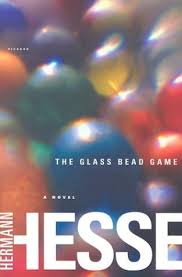
I spent last few days reading the magnum opus of Herman Hesse , The Glass Bead Game. After going through some tiresome forty pages of introduction, I began with the life of Joseph Knecht, who was born into twenty-fifth century, according to our author.
This book is not an ordinary novel or biography, it demands your participation. While reading it , I had to pause many times for short meditation and contemplation exercises. I enjoyed them truly and found them fruitful.
Castalia , the educational province had a fine sketch and a major role to play in the book.
I realized that my experience of Banasthali helped me to get the idea of Castalia. They both are aloof from the outside world. In the period after Banasthali , I have often longed for the childlike innocence and simplicity of Banasthali Life. But this dichotomy of life is presented in many forms in the book.
The subject of dichotomy brings Blake to my mind. He had said , ‘Without contraries is no progression’. The crux of his “Songs of Innocence” and “Songs of Experience” is that both innocence and experience are required for the development of soul. This experience is not something evil or worldly but a belief that truth is not simple or blissful. And this perhaps what Knecht realized later in his life and resigned from the post of Magister. He craved for risks, sufferings and worldly experiences. The innocence, chastity , intellectual freedom of Castalian life would not provide for the other side of his soul.
And It’s not only about being aware of dichotomies but about crossing the threshold of known to the realms of unknown. Knecht , in his childhood , had called it “a leap”. In his own words, “ But I do wish that if ever time comes and it proves to be necessary, that I too will be able to free myself and leap, only not backward into something inferior but forward into something higher.”
Freeing oneself – sounds so blissful. But it isn’t always easy to free yourself. When you grow your consciousness of the Life consisting of different stages and your ultimate goal would be something higher than things related to the World and aspirations of present life, you would be able to free yourself. You would move swiftly, firmly and without fear or regrets to the next stage , even if it is the period after promising youth or death.
Stages - a poem by Hermann Hesse , From Glass Bead Game
As every flower fades and as all youth
Departs, so life at every stage,
So every virtue, so our grasp of truth,
Blooms in its day and may not last forever.
Since life may summon us at every age
Be ready, heart, for parting, new endeavor,
Be ready bravely and without remorse
To find new light that old ties cannot give.
In all beginnings dwells a magic force
For guarding us and helping us to live.
Serenely let us move to distant places
And let no sentiments of home detain us.
The Cosmic Spirit seeks not to restrain us
But lifts us stage by stage to wider spaces.
If we accept a home of our own making,
Familiar habit makes for indolence.
We must prepare for parting and leave-taking
Or else remain the slave of permamence.
Even the hour of our death may send
Us speeding on to fresh and newer spaces,
And life may summon us to newer races.
So be it, heart: bid farewell without end.
